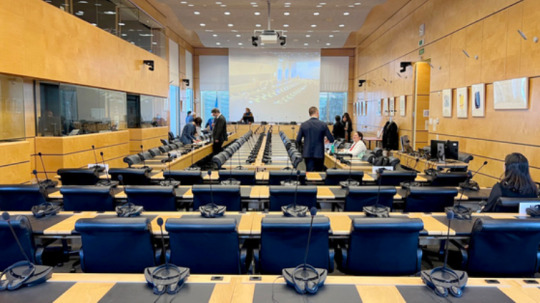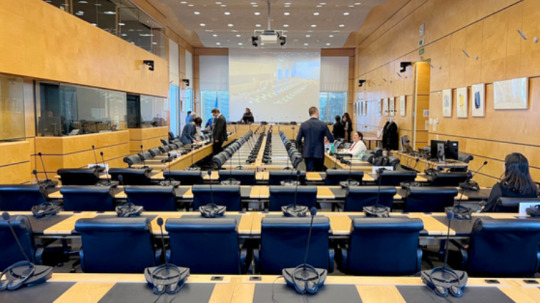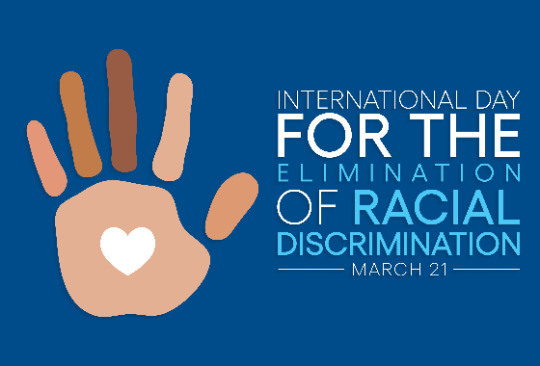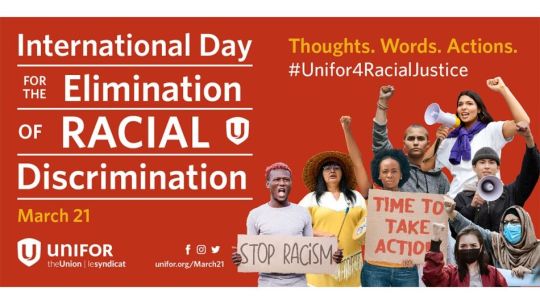Text
3066th Meeting, 112th Session, Committee on the Elimination of Racial Discrimination (CERD).
Consideration of Moldova - Watch the 3066th Meeting, 112th Session, Committee on the Elimination of Racial Discrimination (CERD).
#ohchr#cerd#plenary session#un human rights council#plenary meeting#racial disparity#racial discrimination#racial divide#racial bias#moldova
0 notes
Text
3065th Meeting, 112th Session, Committee on the Elimination of Racial Discrimination (CERD).
The Committee on the Elimination of Racial Discrimination (CERD) is the body of independent experts that monitors implementation of the Convention on the Elimination of All Forms of Racial Discrimination by its States parties.
Watch the Consideration of Moldova -3065th Meeting, 112th Session, Committee on the Elimination of Racial Discrimination (CERD)!

#moldova#exclusions and restrictions#racial bias#racial discrimination#human rights#un human rights council#committee on the elimination of racial discrimination#plenary session#plenary meeting#cerd
0 notes
Text
3064th Meeting, 112th Session, Committee on the Elimination of Racial Discrimination (CERD).
Racial discrimination remains a barrier to the full realization of human rights. Despite progress in some areas, exclusions and restrictions based on race, colour, descent, national or ethnic origin continue to cause conflict, suffering and loss of life. CERD works to take action against the injustice of racial discrimination, and the dangers it represents.
Watch the Consideration of Qatar (continued) - 3064th Meeting, 112th Session, Committee on the Elimination of Racial Discrimination (CERD)!
#plenary session#un human rights council#cerd#human rights#racial bias#racial discrimination#exclusions and restrictions#ohchr
0 notes
Text
3063rd Meeting, 112th Session, Committee on the Elimination of Racial Discrimination (CERD).
Consideration of Qatar. - Watch the 3063rd Meeting, 112th Session, Committee on the Elimination of Racial Discrimination (CERD).
#qatar#committe on the elimination of racial discrimination#racial discrimination#ohchr#plenary meeting#un human rights council#cerd
0 notes
Text
3062nd Meeting, 112th Session, Committee on the Elimination of Racial Discrimination (CERD).
Consideration of Albania (continued) - Watch the 3062nd Meeting, 112th Session, Committee on the Elimination of Racial Discrimination (CERD).
#racial inequality#special rapporteur on contemporary forms of racism#committe on the elimination of racial discrimination#plenary meeting#un human rights council#cerd
0 notes
Text
3061st Meeting, 112th Session, Committee on the Elimination of Racial Discrimination (CERD).
Consideration of Albania- 3061st Meeting, 112th Session, Committee on the Elimination of Racial Discrimination (CERD)
#albania#racial discrimination#cerd#un geneva#ohchr#committe on the elimination of racial discrimination
0 notes
Text
3056th Meeting, 112th Session, Committee on the Elimination of Racial Discrimination (CERD)
Watch the Consideration of San Marino (continued) - 3056th Meeting, 112th Session, Committee on the Elimination of Racial Discrimination (CERD)
#committe on the elimination of racial discrimination#san marino#cerd#racial discrimination#un human rights council#plenary session
0 notes
Text
3055th Meeting, 112th Session, Committee on the Elimination of Racial Discrimination (CERD).
Consideration of San Marino - 3055th Meeting, 112th Session, Committee on the Elimination of Racial Discrimination (CERD).
#committe on the elimination of racial discrimination#plenary meeting#san marino#un human rights council#racial discrimination
0 notes
Text
3053rd Meeting, 112th Session, Committee on the Elimination of Racial Discrimination (CERD).
Watch the Consideration of Mexico at the 3053nd Meeting, 112th Session, Committee on the Elimination of Racial Discrimination (CERD)!

#plenary session#plenary meeting#committe on the elimination of racial discrimination#racial discrimination#un human rights council
0 notes
Text
3052nd Meeting, 112th Session, Committee on the Elimination of Racial Discrimination (CERD).
Watch the Consideration of Mexico at the 3052nd Meeting, 112th Session, Committee on the Elimination of Racial Discrimination (CERD)!
#mexico#meeting#committe on the elimination of racial discrimination#plenary session#racial discrimination
0 notes
Text
3050th Meeting, 112th Session, Committee on the Elimination of Racial Discrimination (CERD).
Opening of Session - The Committee on the Elimination of Racial Discrimination (CERD) is the body of independent experts that monitors implementation of the Convention on the Elimination of All Forms of Racial Discrimination by its States parties. Racial discrimination remains a barrier to the full realization of human rights. Despite progress in some areas, exclusions and restrictions based on race, colour, descent, national or ethnic origin continue to cause conflict, suffering and loss of life. CERD works to take action against the injustice of racial discrimination, and the dangers it represents.
Related Sites and Documents
CERD 112th Session (08 Apr 2024 - 26 Apr 2024)
Watch the 3050th Meeting, 112th Session, Committee on the Elimination of Racial Discrimination (CERD).
#racial inequality#plenary session#plenary meeting#ohchr#un human rights council#cerd#committe on the elimination of racial discrimination
0 notes
Text
Week of Solidarity with the Peoples Struggling against Racism and Racial Discrimination, 21-27 March | United Nations.

The International Week of Solidarity with the Peoples Struggling against Racism and Racial Discrimination, will be held from 21-27 March 2024. United Nations
#United Nations#International Week of Solidarity with the Peoples Struggling against Racism and Racial Discrimination#International weeks
0 notes
Text
Reflecting on the journey towards equality.

“If we do not occupy this great avenue in which we all can recognise ourselves from our human identity, we will not achieve the dream looming on the horizon, which is the dream of dignity for all people,” said Epsy Campbell Barr, former Vice-president of Costa Rica, and a member of the Permanent Forum on People of African Descent.
Every year, the International Day for the Elimination of Racial Discrimination is observed on 21 March, the same day the police in Sharpeville, South Africa, opened fire and killed 69 people at a peaceful demonstration against apartheid "pass laws" in 1960.
“The history goes back to South Africa, where apartheid placed Black people at the bottom of the rights ladder in that country,” Campbell Barr said.
By proclaiming this International Day in 1966, the General Assembly urged the international community to reinforce its efforts to combat racism and eliminate all forms of racial discrimination. This year’s theme focuses on “A Decade of Recognition, Justice, and Development: Implementation of the International Decade for People of African Descent”, in reference to the International Decade for People of African Descent, which has lasted from 2015 to 2024.
“People of African descent are the victims of the worst human tragedy that humanity has experienced for a long enough period of time to have consequences in the present, and that is the transatlantic trafficking of African people and their subsequent enslavement.“
EPSY CAMPBELL BARR, FORMER VICE-PRESIDENT OF COSTA RICA, AND MEMBER OF THE PERMANENT FORUM ON PEOPLE OF AFRICAN DESCENT
The UN High Commissioner for Human Rights has served as the coordinator for the International Decade, overseeing various activities from the Fellowship programme for people of African descent, the enhancing of the anti-discrimination database, the preparation of annual reports for the Secretary General, to the promotion and awareness raising on the International Decade, including through the organization of regional meetings around the globe to further advance the objectives of the Decade.
“The relevance of the International Decade is that globally, nations agree that there is a human group, people of African descent, who are at a relative disadvantage that is great enough to prioritise action for 10 years,” Campbell Barr said. “If people of African descent are not recognised, if people do not understand that we are part of the population, if they do not understand the conditions we are in, if they do not put the issue of systemic racism, anti-Black and anti-Black African racism, as a central issue, it is impossible to achieve justice and development.”
“The International Decade has to be understood as part of the global agenda of the United Nations, it has to be understood as part of the 2030 Agenda for Sustainable Development. It is necessary to insert the International Decade in the great promise to 'leave no one behind'. But in the case of people of African Descent, it is 'don’t keep us behind,' which is a very different thing,” Campbell Barr said.
A second International Decade
Martha Liliana Meza Castillo, a Colombian Black woman, sociologist, journalist who specializes in conflict, peace, education and human rights, has worked with Black communities in Colombia in the context of the armed conflict in this country. By her own initiative, she promoted the International Decade to inform Afro-descendants about their rights and how this tool could be useful to them.
“A second International Decade is important because it is necessary to continue working in the fight against racial and systematic discrimination and injustice, even if it sounds repetitive and they say that we are victimising ourselves. It is a reality that we are living, and as a society we still have a long way to go, especially in terms of justice and the recognition of the historical contribution that people of African descent have made to societies,” Meza Castillo said. “We have to continue on this path to achieve the objectives of a more just and dignified society.”
According to Meza Castillo, there was not enough support by the government and the International Decade was promoted by word of mouth among Black communities in Colombia, which was very useful, with people saying: “at the UN there is a mandate for us now, the government has to start fulfilling it.”
For her, the International Decade inspired the inclusion of an ethnic chapter in the negotiation of the peace accords in the South American country.
“I believe that the International Decade inspired these communities to demand from the government a place, a space and a leading role at the negotiating table, to achieve recognition of the disproportionate impact that the ethnic communities have endured during the armed conflict and the demand of no repetition,” Meza Castillo said.
“A second International Decade is needed because people of African descent remain the poorest amongst the poorest, because political representation systemically excludes people of African descent, because racism remains systemic, and because we need to redress the consequences of enslavement that are manifested today in the lives of millions of people of African descent.“
EPSY CAMPBELL BARR, FORMER VICE-PRESIDENT OF COSTA RICA, AND MEMBER OF THE PERMANENT FORUM ON PEOPLE OF AFRICAN DESCENT
For Campbell Barr, in various countries, the International Decade has made it possible to advance specific public policies based on the recognition of people of African descent, both through the implementation of affirmative actions and specific awareness-raising campaigns.
“In terms of justice and development we have not made any progress, because the judicial systems are the same, because the colonial structure still places Black people in a real denial of rights,” Campbell Barr said. “For example, in the over-representation of Black people and Black youth in the prison system, the injustice against Afro-descendants where we can see the triple punishment for being an Afro-descendant.”
“They are punished because all their rights are taken away and they are then in a situation of exclusion. This situation of exclusion makes them much more vulnerable to criminal networks and illegal activities for which they are literally kidnapped and because the justice system already has a subjective burden to place them in a situation of greater vulnerability due to their racial ethnic identity,” Campbell Barr said.
According to Campbell Barr, there has been no progress in terms of development, as the data and social and economic indicators of many countries continue to show that people of African descent are at the end of the line.
“It is important to give a stronger voice to the diversity of Afro-descendant voices in development debates because racial discrimination also takes away people's voices and it is necessary to listen to the voices of those who historically have not been able to say what they think, put forward their perspectives and bring to the debate their energies and that spiritual, emotional and cultural logic that is so necessary,” Campbell Barr said.
Informing other struggles

People protest against racism and demand justice.
“I think struggles are absolutely intertwined. What we are striving for is a new pact, a pact that gives equal dignity to all people,” Campbell Barr said. “The efforts we Afro descendants make have an impact on the inclusion and rights of the most excluded sectors of the population, and everything we do makes sense for these groups, for indigenous peoples, for women, for people with disabilities, for migrants.”
There is no way to understand the struggle against systemic racism without understanding the social, economic, and cultural structure that ranks people based on their diverse identities, she added.
“Our struggle is the struggle of all people who are demanding dignity, that dignity that we deserve just because we are people,” Campbell Barr said. “Let's not fool ourselves, let's not try to imagine that we could survive in a structure of discrimination by saving some and leaving the rest out.”
#21 march#stand up against racial discrimination#systemicracism#fight racism#International Decade for People of African Descent#ohchr
0 notes
Text
PACE Committee on Equality and Non-Discrimination on combating racism and intolerance made the following statement

“The International day for the elimination of racial discrimination is an opportunity to reflect on the progress achieved in countering racism at global level, and on how to tackle the challenges that people of African descent still face. This year, as the International Decade for People of African Descent 2015-2024, proclaimed by the General Assembly of the United Nations, draws to a close, the picture is far from satisfying.
In 2020, the violent death of George Floyd at the hand of the police and the widespread protests that followed on both sides of the Atlantic sparked awareness of the extent of Afrophobia and the need to tackle it. A window of opportunity seemed to be open for legislators, policy makers and the society at large to seize. The developments since then are not always positive. Deeply entrenched racism endures. New forms of prejudice targeting people of African descent emerge. The current political landscape is a reason for concern, with racist and xenophobic populist movements resisting progress and undermining the struggle for inclusiveness and respect.
As members of the Committee on equality and non-discrimination, we reaffirm on this occasion our commitment to counter all forms of racism. Referring to Resolution 2389 (2021) on Combating Afrophobia, or anti-Black racism, in Europe, we reiterate our call on fellow politicians and public authorities to counter racism in all its forms, including at institutional level, and multiple and intersectional discrimination; recognise the contribution of people of African descent to Europe’s development and culture; and to recognise the negative impact of colonialism, enslavement and the transatlantic slave trade.
Finally, we reiterate our support to the No Hate Parliamentary Alliance. We believe in the Charter of European political parties for a non-racist and inclusive society, based on political parties self-regulation power, as an important tool to prevent and counter racial discrimination.”
#PACE-APPS#21 march#international day for the elimination of racial discrimination#council of europe#parliamentary assembly#statements
0 notes
Text
Today we join our voices again to urge all States to push forward in the fight against racial discrimination.

“The commemoration of the International Day for the Elimination of Racial Discrimination is a moment to take stock of the persistent gaps in the implementation of our shared commitment to protect hundreds of millions of people whose human rights continue to be violated due to racial discrimination. It is also an opportunity to recommit to our promise to fight all forms of racism everywhere.
Through our work, we see clearly that racism, racial discrimination, xenophobia, and related intolerance continue to be a cause of conflict around the world. We are witnessing a dangerous regression in the fight against racism and racial discrimination in many spaces. Minorities, people of African descent, people of Asian descent, Indigenous Peoples, migrants, including asylum seekers and refugees, are particularly vulnerable as they often face discrimination in all aspects of their lives based on their racial, ethnic or national origin, skin colour or descent. In this regard, it is crucial that States implement their international human rights obligations and commitments under the International Convention on the Elimination of All Forms of Racial Discrimination and the Durban Declaration and Programme of Action.
Initiatives aimed at revitalising multilateralism, including the Summit of the Future, provide an important opportunity to firmly establish the collective responsibility of States in ensuring concrete progress to address structural and systemic racial discrimination and its root causes.
The proclamation of an International Decade for people of African Descent in 2014 marked a significant milestone in the global effort to combating systemic racism and racial discrimination faced by people of African descent worldwide.
As the International Decade comes to an end, it is time to confront and rectify the pervasive obstacles and barriers hampering recognition, justice, and development for people of African descent. We call on States to respond to growing calls for reparatory justice and economic empowerment for people of African descent. We also call on States to leave no person of African descent behind in their efforts to realise the Sustainable Development Goals.
Today we join our voices again to urge all States to push forward in the fight against racial discrimination. We also call on States to proclaim a second International Decade for People of African Descent, to ensure greater recognition, justice, and development for people of African descent, including by engaging meaningfully in reparatory justice processes for past injustices.”
*The experts: Ms. Ashwini K.P., Special Rapporteur on contemporary forms of racism, racial discrimination, xenophobia and related intolerance; Ms. Tracie L. Keesee and Mr. Juan E. Méndez, Experts of the International Independent Expert Mechanism to Advance Racial Justice and Equality in the context of Law Enforcement; Ms. Barbara Reynolds, Chairperson, Working Group of Experts on People of African Descent; Ms. Verene Shepherd, Chairperson, Committee on the Elimination of Racial Discrimination, Ms. June Soomer, Chairperson-Designate, Permanent Forum on People of African Descent; and Ms. Hanna Suchocka, Chairperson, Group of Independent Eminent Experts on the Implementation of the Durban Declaration and Programme of Action
For further information and media enquiries, please contact: Niraj Dawadi ([email protected])
#International Day for the Elimination of Racial Discrimination#21 march#racial inequality#Special Rapporteur on contemporary forms of racism#International Independent Expert Mechanism to Advance Racial Justice and Equality in the context of Law Enforcement#Working Group of Experts on People of African Descent#Committee on the Elimination of Racial Discrimination#Permanent Forum on People of African Descent#Group of Independent Eminent Experts on the Implementation of the Durban Declaration and Programme of Action#statements
0 notes
Text
UN Secretary-General Antonio Guterres Message on the International Day for The Elimination of Racial Discrimination 2024; March 21st.

Racism is an evil infecting countries and societies around the world – a deeply entrenched legacy of colonialism and enslavement.
The results are devastating: opportunities stolen; dignity denied; rights violated; lives taken and lives destroyed.
Racism is rife, but it impacts communities differently.
The theme of this year’s International Day for the Elimination of Racial Discrimination highlights this, focussing on people of African descent, recognition, justice and development.
People of African descent face a unique history of systemic and institutionalized racism, and profound challenges today. We must respond to that reality – learning from, and building on, the tireless advocacy of people of African descent.
That includes governments advancing policies and other measures to eliminate racism against people of African descent.
And tech firms urgently addressing racial bias in artificial intelligence.
On this Day, let’s commit to work together to build a world of dignity, justice and equal opportunity for every community, everywhere.
#advancing policies#advancing measures#eliminate racism#addressing racial bias#united nations secretary general#statements#racism#21 march#international day for the elimination of racial discrimination
0 notes
Text
Recognize that eradicating racial discrimination requires sustained effort and collaboration across diverse sectors.

Through dialogue and education, we can dismantle the harmful stereotypes and misconceptions that fuel bigotry and hatred. By fostering inclusivity and empathy, we can create environments where all individuals feel valued, respected, and empowered. As advocates for social change, Unifor is committed to promoting diversity, equity, and inclusion in all facets of society.
We recognize that eradicating racial discrimination requires sustained effort and collaboration across diverse sectors. By forging partnerships with community organizations, advocacy groups, and policymakers, we can effect meaningful change and build a more just and equitable society for all. We encourage members to participate in events in their communities and seek out opportunities to advance their understanding of racism and its impacts.
Together, we stand in solidarity with all workers and communities in the pursuit of a world free from racial discrimination.
#bigotry and hatred#stereotypes and misconceptions#inclusivity and empathy#community organizations#advocacy groups#policymakers#international day for the elimination of racial discrimination
0 notes